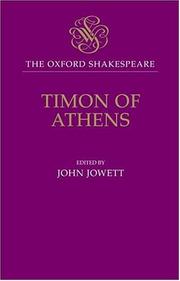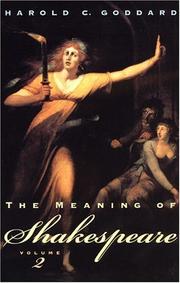| Listing 1 - 5 of 5 |
Sort by
|
Book
ISBN: 1785435779 9781785435775 Year: 2016 Publisher: London : Copyright Group,
Abstract | Keywords | Export | Availability | Bookmark
 Loading...
Loading...Choose an application
- Reference Manager
- EndNote
- RefWorks (Direct export to RefWorks)

ISBN: 0198129386 9781429469173 142946917X 0192814974 9780198129387 0191732591 9786610846924 1280846925 0191561363 Year: 2004 Publisher: New York : Oxford University Press,
Abstract | Keywords | Export | Availability | Bookmark
 Loading...
Loading...Choose an application
- Reference Manager
- EndNote
- RefWorks (Direct export to RefWorks)
'Timon of Athens' is a bitterly intriguing study of a fabulously rich man who wastes his wealth on his friends, and, when he is finally impoverished, learns to despise humanity with a hatred that drives him to his grave.
Shakespeare, William --- Timon of Athens (Legendary character) --- Drama --- Timon of Athens (Legendary character) in literature --- Loss (Psychology) --- Rich people --- Recluses --- Poor --- Athens (Greece) --- Eccentrics and eccentricities --- Hermits --- Psychology --- Shakespeare, William, --- Timon, --- Τίμων, --- In literature. --- Timon of Athens (Legendary character) in literature. --- Shadwell, Thomas,
Book
ISBN: 9783110246988 3110246988 1283399784 9786613399786 3110246996 9783110246995 Year: 2011 Volume: 290 Publisher: New York : De Gruyter,
Abstract | Keywords | Export | Availability | Bookmark
 Loading...
Loading...Choose an application
- Reference Manager
- EndNote
- RefWorks (Direct export to RefWorks)
Within Lucian's works, Timon is referable to the writer's maturity and it is considered to be one of the best and most typical dialogues written by the author from Samosata. This study traces the story of the fascinating and enigmatical character of the Athenian Timon, a archetype of a misanthrop, in his literary development up to his crucial meeting with Lucian of Samosata. The work offers, for the first time, an analytical commentary on Lucian's Timon. The reader will find in the book an introduction, which is divided in four different sections: the first contains some general notes on the Second Sophistic and Lucian; the second restores the literary development of the misanthrope Timon from his origins in the Attic comedy to the II century a.D.; the third part offers an analysis of the relationship between Lucian's Timon and the literary tradition, and, afterwards, an investigation into the dialogue's fortune from the II century to the XX century; the last section gives short but exhaustive details about the literary style and the language used in the work. To facilitate the consultation, the analytical commentary is again divided into sections - each one with a short individual introduction - and follows the Greek text and the translation.
Dialogues, Greek --- Dialogues grecs --- Translations into Italian --- Traductions italiennes --- Lucian, --- Dialogues, Greek -- Translations into Italian. --- Lucian, of Samosata. Timon. --- Greek dialogues --- Loekianos, --- Loukianos, --- Lucià, --- Luciano, --- Lucianus Samosatensis --- Lucien, --- Lukian, --- Lúkiános, --- Lūkiyān al-Sumaysāṭī --- Lūqiyān al-Samīsāṭī --- Lūqyānūs al-Samīsāṭī --- Samosata, Lucian of --- Λουκιανóς, --- לוציאן --- לוציאן, --- لوقيان السميساطي --- لوقيانوس --- Greek literature --- Timon, --- Lucianus Samosatenus --- Lukian --- Lucianus --- Lucien --- Lucien de Samosate --- Lucianus van Samosata --- Lucianus Samosatensis Satiricus. --- Lucian --- Dialogues. --- Lucian. --- Second Sophistic. --- Timon.
Book
ISBN: 022636349X 9780226363493 9780226363356 022636335X Year: 2016 Publisher: Chicago : University of Chicago Press,
Abstract | Keywords | Export | Availability | Bookmark
 Loading...
Loading...Choose an application
- Reference Manager
- EndNote
- RefWorks (Direct export to RefWorks)
The Corporate Commonwealth traces the evolution of corporations during the English Renaissance and explores the many types of corporations that once flourished. Along the way, the book offers important insights into our own definitions of fiction, politics, and value. Henry S. Turner uses the resources of economic and political history, literary analysis, and political philosophy to demonstrate how a number of English institutions with corporate associations-including universities, guilds, towns and cities, and religious groups-were gradually narrowed to the commercial, for-profit corporation we know today, and how the joint-stock corporation, in turn, became both a template for the modern state and a political force that the state could no longer contain. Through innovative readings of works by Thomas More, William Shakespeare, Francis Bacon, and Thomas Hobbes, among others, Turner tracks the corporation from the courts to the stage, from commonwealth to colony, and from the object of utopian fiction to the subject of tragic violence. A provocative look at the corporation's peculiar character as both an institution and a person, The Corporate Commonwealth uses the past to suggest ways in which today's corporations might be refashioned into a source of progressive and collective public action.
Corporations --- State, The --- Political aspects --- History --- Philosophy. --- pluralism, politics, england, corporations, english renaissance, value, hobbes, francis bacon, shakespeare, thomas more, colony, commonwealth, utopia, violence, commerce, profit, guilds, universities, richard hooker, ulster project, liberty, power, authority, leviathan, new atlantis, nature, coriolanus, timon of athens, julius caesar, titus andronicus, hamlet, shoemakers holiday, dekker, hakluyt, nonfiction, history, religion.

ISBN: 0226300412 0226300420 9786612069888 1282069888 0226300390 9780226300399 Year: 1960 Publisher: Chicago : University of Chicago Press,
Abstract | Keywords | Export | Availability | Bookmark
 Loading...
Loading...Choose an application
- Reference Manager
- EndNote
- RefWorks (Direct export to RefWorks)
In two magnificent and authoritative volumes, Harold C. Goddard takes readers on a tour through the works of William Shakespeare, celebrating his incomparable plays and unsurpassed literary genius.
English literature. --- British literature --- Inklings (Group of writers) --- Nonsense Club (Group of writers) --- Order of the Fancy (Group of writers) --- Shakespeare, William, --- Shakespeare, William --- Shakespear, William, --- Shakspeare, William, --- Šekʻspiri, Uiliam, --- Saixpēr, Gouilliam, --- Shakspere, William, --- Shikisbīr, Wilyam, --- Szekspir, Wiliam, --- Šekspyras, --- Shekspir, Vilʹi︠a︡m, --- Šekspir, Viljem, --- Tsikinya-chaka, --- Sha-shih-pi-ya, --- Shashibiya, --- Sheḳspir, Ṿilyam, --- Shaḳspir, Ṿilyam, --- Syeiksŭpʻio, --- Shekspir, V. --- Szekspir, William, --- Shakespeare, Guglielmo, --- Shake-speare, William, --- Sha-ō, --- Şekspir, --- Shekspir, Uiliam, --- Shekspir, U. --- Šekspir, Vilijam, --- Ṣēkspiyar, Viliyam, --- Shakspir, --- Shekspyr, Vyli︠e︡m, --- Şekspir, Velyam, --- Ṣēkspiyar, Villiyam, --- Shēkʻspʻiyr, Vlilliam, --- Ṣēkspiyar, --- Ṣēkspiyar Mahākavi, --- Ṣēkspiyar Mahākaviya, --- Sheḳspier, Ṿilyam, --- Shēkʻspir, --- Shakespeare, --- Śeksper, --- Шекспир, Вильям, --- Шекспир, Уильям, --- שייקספיר, וויליאם, --- שייקספיר, וו., --- שיקספיר, וויליאם --- שיקספיר, ויליאם --- שיקספיר, ויליאם, --- שכספיר, ויליאם, --- שכספיר, וילים, --- שכספיר, ו׳ --- שעפקספיר, וויליאם, --- שעקספיער, וויליאם --- שעקספיער, וויליאם, --- שעקספיער, ווילליאם --- שעקספיער, וו., --- שעקספיר --- שעקספיר, וו --- שעקספיר, וויליאם, --- שעקספיר, וויליאמ --- שעקספיר, ווילליאם --- שעקספיר, ווילליאם, --- שעקספיר, וו., --- שעקספיר, װיליאם, --- שעקספיר, װילליאם, --- שעקספיר, װ., --- שעקספער --- שעקספער, וויליאמ --- שקספיר --- שקספיר, וו --- שקספיר, וויליאם --- שקספיר, וויליאם, --- שקספיר, ווילים, --- שקספיר, וילאם --- שקספיר, ויליאם --- שקספיר, ויליאם, --- שקספיר, ויליים, --- שקספיר, וילים --- שקספיר, וילים, --- شاكسبير، وليم --- شاكسپير، وليم --- شكسبير، وليام --- شكسبير، وليم --- شكسبير، وليم، --- شكسبير، و. --- شكسپير، وليم --- شكسپير، ويليام --- شيكسبير، وليام --- شيكسبير، وليام.، --- شيكسبير، وليم --- شکسبير، وليم --- وليم شکسبير --- 沙士北亞威廉姆, --- 沙士比亞威廉姆, --- 莎士比亞威廉姆, --- 莎士比亞威廉, --- 莎士比亞, --- Criticism and interpretation. --- tempest, winters tale, cymbeline, pericles, coriolanus, antony and cleopatra, timon of athens, king lear, macbeth, othello, measure, alls well, troilus cressida, tragedies, comedies, problem plays, drama, theater, performing arts, shakespeare, british literature, canon, revenge, love, romance, humor, folklore, trojan war, ambition, murder, jealousy, marriage, history. --- Literature. --- Shakespeare-Macbeth-Criticisms. --- LITERARY CRITICISM / General. --- Belles-lettres --- Western literature (Western countries) --- World literature --- Philology --- Authors --- Authorship
| Listing 1 - 5 of 5 |
Sort by
|

 Search
Search Feedback
Feedback About UniCat
About UniCat  Help
Help News
News